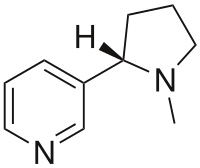
Photo from wikipedia
Introduction Either exposure to secondhand smoke (SHS) or frailty has been linked to adverse health outcomes in nonsmoking adults. However, their relationship is rarely studied. The purpose of this study… Click to show full abstract
Introduction Either exposure to secondhand smoke (SHS) or frailty has been linked to adverse health outcomes in nonsmoking adults. However, their relationship is rarely studied. The purpose of this study is to examine the association between serum cotinine level and frailty status among non-smoking older adults. Method The study population consisted of 2,703 older adults aged ≥60 from the National Health and Nutrition Examination Survey 2011–2014. Non-smokers were included based on (1) a serum cotinine level ≤ 10 ng/mL and 2) a response of “no” to the question, “Do you currently smoke?” Frailty status was measured based on the Fried Phenotype and had three groups- robust, pre-frailty, and frailty. Multinomial logistic regression models were constructed to examine the association between serum cotinine level quartile and frailty status, controlling for age, sex, race/ethnicity, education, depressive symptoms, alcohol use, and systolic blood pressure. Results About half of the participants (median age 70.0 years, range 64–78) were female (53.6%), non-Hispanic White (48.3%), and completed some college and above (50.1%). Multinomial logistic regression with a reference group being those in the 1st quantile (the lowest) of serum cotinine level showed that participants in the 4th quartile (the highest) of serum cotinine level had increased odds of pre-frailty vs. robust (OR 1.522, 95% confidence interval [CI] 1.060, 2.185, P = 0.023) as well as increased odds of frailty vs. robust (OR 2.349, 95% CI 1.081, 5.107, P = 0.031). Conclusions Higher serum cotinine level is associated with increased risk of pre-frailty and frailty versus robust in non-smoking older adults. Prevention and reduction of SHS in older adults may help protect them from developing pre-frailty or frailty.
Journal Title: Frontiers in Psychiatry
Year Published: 2022
Link to full text (if available)
Share on Social Media: Sign Up to like & get
recommendations!